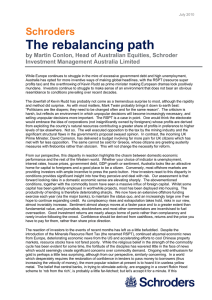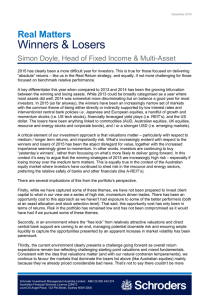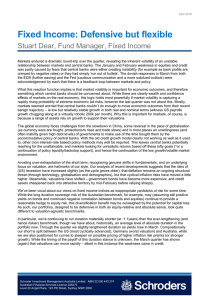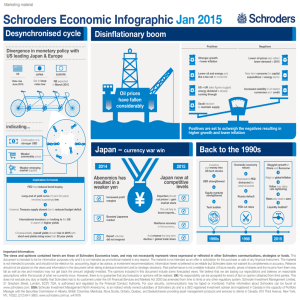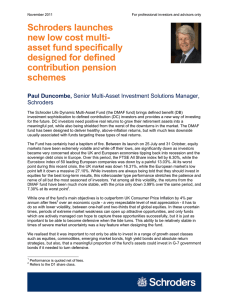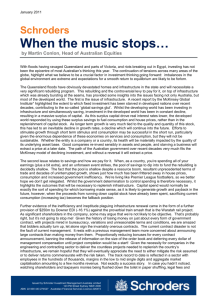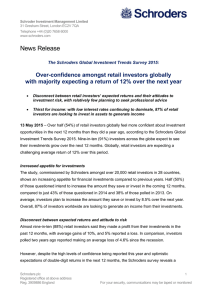Schroders Clearing up after the train wreck
advertisement
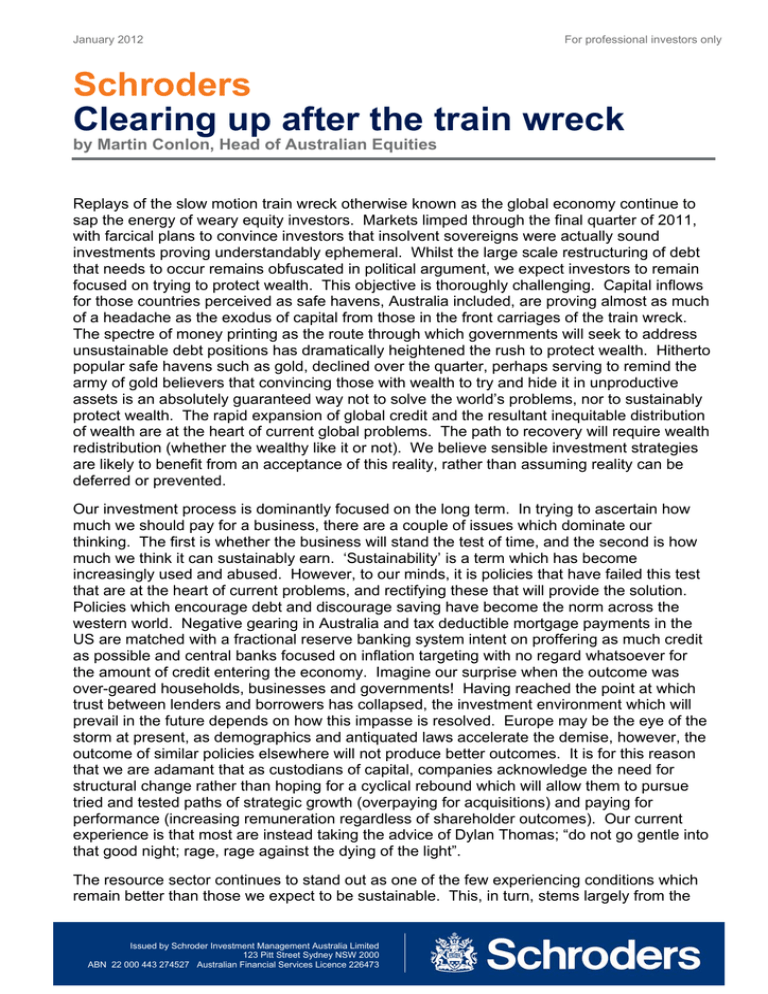
January 2012 For professional investors only Schroders Clearing up after the train wreck by Martin Conlon, Head of Australian Equities Replays of the slow motion train wreck otherwise known as the global economy continue to sap the energy of weary equity investors. Markets limped through the final quarter of 2011, with farcical plans to convince investors that insolvent sovereigns were actually sound investments proving understandably ephemeral. Whilst the large scale restructuring of debt that needs to occur remains obfuscated in political argument, we expect investors to remain focused on trying to protect wealth. This objective is thoroughly challenging. Capital inflows for those countries perceived as safe havens, Australia included, are proving almost as much of a headache as the exodus of capital from those in the front carriages of the train wreck. The spectre of money printing as the route through which governments will seek to address unsustainable debt positions has dramatically heightened the rush to protect wealth. Hitherto popular safe havens such as gold, declined over the quarter, perhaps serving to remind the army of gold believers that convincing those with wealth to try and hide it in unproductive assets is an absolutely guaranteed way not to solve the world’s problems, nor to sustainably protect wealth. The rapid expansion of global credit and the resultant inequitable distribution of wealth are at the heart of current global problems. The path to recovery will require wealth redistribution (whether the wealthy like it or not). We believe sensible investment strategies are likely to benefit from an acceptance of this reality, rather than assuming reality can be deferred or prevented. Our investment process is dominantly focused on the long term. In trying to ascertain how much we should pay for a business, there are a couple of issues which dominate our thinking. The first is whether the business will stand the test of time, and the second is how much we think it can sustainably earn. ‘Sustainability’ is a term which has become increasingly used and abused. However, to our minds, it is policies that have failed this test that are at the heart of current problems, and rectifying these that will provide the solution. Policies which encourage debt and discourage saving have become the norm across the western world. Negative gearing in Australia and tax deductible mortgage payments in the US are matched with a fractional reserve banking system intent on proffering as much credit as possible and central banks focused on inflation targeting with no regard whatsoever for the amount of credit entering the economy. Imagine our surprise when the outcome was over-geared households, businesses and governments! Having reached the point at which trust between lenders and borrowers has collapsed, the investment environment which will prevail in the future depends on how this impasse is resolved. Europe may be the eye of the storm at present, as demographics and antiquated laws accelerate the demise, however, the outcome of similar policies elsewhere will not produce better outcomes. It is for this reason that we are adamant that as custodians of capital, companies acknowledge the need for structural change rather than hoping for a cyclical rebound which will allow them to pursue tried and tested paths of strategic growth (overpaying for acquisitions) and paying for performance (increasing remuneration regardless of shareholder outcomes). Our current experience is that most are instead taking the advice of Dylan Thomas; “do not go gentle into that good night; rage, rage against the dying of the light”. The resource sector continues to stand out as one of the few experiencing conditions which remain better than those we expect to be sustainable. This, in turn, stems largely from the Issued by Schroder Investment Management Australia Limited 123 Pitt Street Sydney NSW 2000 ABN 22 000 443 274527 Australian Financial Services Licence 226473 January 2012 For professional advisers only pursuit of Chinese policies which we believe are similarly unsustainable. While this remains an unpopular, and to date incorrect standpoint, emerging cracks in the Chinese miracle are provoking slightly more objective analysis and a little less “but think of all the people moving from farms into urban areas”, resulting in the materials sector struggling over the quarter (3.1%). Merger and acquisition activity remains solidly focused in this sector, with the merger proposal between Aston Resources (-9.5%) and Whitehaven Coal (-0.8%) the major deal of the quarter, whilst Gloucester Coal (+27.4%) also benefited from a merger proposal from Yanzhou Coal. Talk of synergies from blending coal and realising even higher prices, saw investors welcome the deal, albeit with greater cynicism than may have been the case a few short years ago. At the other end of the spectrum, which should give some insights into the underlying profitability of much Chinese enterprise, steel stocks were on their knees as an absence of that annoyingly necessary lifeblood, profit and cashflow, forced Bluescope Steel (-34.5%) into raising further capital and punished OneSteel (-43.6%) on the expectation that it requires a similar transfusion. The positive side of the ledger was again dominated by more defensive businesses, with utilities (+8.1%) and telecoms (+6.95) continuing their solid performance. We have sympathy for the strong and sustainable of cashflow streams from businesses in these sectors, however, we remain somewhat wary of the aggressive financial engineering used in many cases. With equally strong franchises in other industrial businesses and areas such as healthcare, we retain a preference for conservative use of financial leverage. Illustrations of businesses struggling with the transition to more austere economic times are plentiful, but perhaps nowhere more so than in the retail sector. The script over recent decades has been nothing if not predictable. Every successful format has driven profit growth by consistently expanding store numbers and assuming consumers will spend more than last year, allowing them to report positive same store sales growth. The propensity of households to consistently increase borrowing levels to fund the purchase of that slightly larger LCD TV with the 3D glasses or the iPhone4S with the slightly better camera has driven an expectation by retailers that one of the ten commandments is ‘thou shalt always buy more unnecessary trash than last year’. Things are changing. The only certainty these days is that Gerry Harvey will regularly appear in the media whingeing about the latest threat to traditional retail. Whether it’s price deflation in electronics, on-line retail having an unfair advantage or landlords hiking rents, inability to accept reality is an ineffective business management tool. Profit warnings over the quarter highlighted the extreme operating leverage inherent in the business models of most retailers, and shareholders behaved similarly to customers; they left the store without buying. JB HiFi fell 25.7%, Billabong 46.7%, Kathmandu 21.2%, David Jones 16.6% and Harvey Norman 12.3%. Accepting the new reality will remain a theme for investors for some time to come. Outlook Having recently watched Meryl Streep as Margaret Thatcher in “The Iron Lady”, the lack of short-term reward for tough decisions and the sometimes heavy price of genuine leadership are all too apparent. Observing the current state of global political leadership and notable absence of iron ladies or gentlemen, we are left expecting a reality which primarily involves the path of least resistance rather than genuine reform. As a result, financial markets seem more likely to continue along the path of responding periodically to initiatives which aim to restore confidence through deception rather than addressing genuine sustainability. It is for this reason that we are wary of expectations of strong returns from equity investment despite apparently cheap valuations versus history. Expectations for equity returns also need to be considered in light of other asset classes which are also likely to deliver unexciting returns, 2 January 2012 For professional advisers only and in no way means that we believe attractively valued businesses cannot be found. We do however, as noted earlier, expect wealth protection to remain challenging. Sustaining profitability and returns on capital in this environment will become an increasingly difficult objective, and we expect that companies which can achieve this objective will perform well. As a result, our portfolio remains skewed towards businesses that we believe have franchises which can endure tougher times and management teams looking to support returns through hard work and productivity gain rather than financial engineering and corporate activity. This hasn’t changed for some time, nor do we expect it to change in the foreseeable future. Disclaimer Opinions, estimates and projections in this article constitute the current judgement of the author as of the date of this article. They do not necessarily reflect the opinions of Schroder Investment Management Australia Limited, ABN 22 000 443 274, AFS Licence 226473 ("Schroders") or any member of the Schroders Group and are subject to change without notice. In preparing this document, we have relied upon and assumed, without independent verification, the accuracy and completeness of all information available from public sources or which was otherwise reviewed by us. Schroders does not give any warranty as to the accuracy, reliability or completeness of information which is contained in this article. Except insofar as liability under any statute cannot be excluded, Schroders and its directors, employees, consultants or any company in the Schroders Group do not accept any liability (whether arising in contract, in tort or negligence or otherwise) for any error or omission in this article or for any resulting loss or damage (whether direct, indirect, consequential or otherwise) suffered by the recipient of this article or any other person. This document does not contain, and should not be relied on as containing any investment, accounting, legal or tax advice. 3
